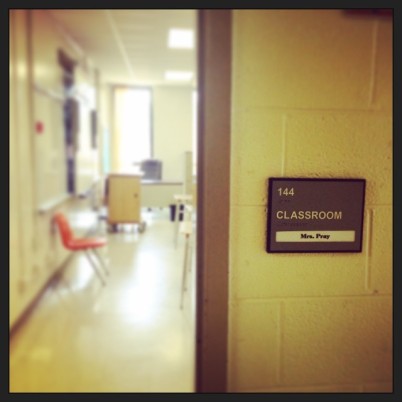
Almost exactly a year ago, I sat at my desk in the classroom where I had taught middle school social studies for three years. Spring break was starting, but I was furiously trying to finish grading a project that students had just turned in, a timeline of the major events of World War II. Grades had to be entered and finalized a few days after the break, but I wouldn’t be returning. My third child was due to make an appearance in the next couple of weeks, and I had decided that juggling three children under the age of five AND a full-time teaching job just wasn’t doable for me. Something had to go, and teaching was it.
I spent eight years of my life teaching, six of them in public school. Deciding to leave the classroom was a process that took several years and caused me serious mental anguish. The truth is, I loved my job. I loved the feeling of camaraderie I shared with the other school employees. I loved the vast majority of the kids, excluding the ones who went out of their way to be assholes. (Yes, I said it. Sometimes seventh-graders are assholes.) I loved when I made an obscure joke about Napoleon and ten percent of the students actually got it. There were many things about teaching that were creative and fun and rewarding. But then there was all the other stuff.

Things teachers do: Dress up like their favorite author and host of “Crash Course: World History”
I stay in close touch with many of my teacher friends. Each time we get together, I hear them talk about school, and I marvel at the fact that I stayed afloat for as long as I did. Their daily lives read like a revised version of Tim O’Brien’s The Things They Carried: They carry laptop cases. They carry Thirty-One bags stuffed to bursting with spelling tests and homework sheets and lab reports. They carry their lunches in microwaveable Pyrex containers of various sizes. They carry the burden of responsibility, not just for their students’ education, but for the children themselves, who carry their personal histories with them to class each day. They carry frustration, thinly-veiled, about the newest accountability initiative forced on them from the top down to prove that they are doing their jobs effectively, in a way that can be quantified.
They carry too much. I was carrying too much. Leaving the classroom was a viable option for me financially, and I understand that my ability to choose to leave was an enormous privilege. For me, it was the right choice. Even though my days at home are equally challenging and equally exhausting, I don’t regret my decision for a second. But I wonder, sometimes, if there is anything that could have convinced me to stay. If the conditions were different, perhaps. The answer is, frankly, yes. And I need someone out there, someone who has some kind of power over the working lives of our country’s educators, to hear me.
I left the classroom because I couldn’t do it all. Thousands and thousands of other really dedicated teachers have done the same. What would have made the difference? For starters:
Pay teachers more. Like a good teacher, I did some research. Nationwide, in 2014 the median salary for a middle school teacher was $54,940. Actually, I didn’t make anywhere close to that. Who gets paid more, on average, than teachers? According to the same U.S. News and World Report list, MRI technologists and dental hygienists are just a couple of the listed occupations with a higher median income than teachers. I’m not hating on MRI technologists or dental hygienists; my husband is a dentist, and I know how important it is to have skilled, sociable hygienists. Those ladies rock. My point, I guess, is that these are jobs that don’t necessarily require a four-year degree, and that you don’t take home with you, at least not in the, “Honey, I know you need mommy to get you a snack, but I’m just finishing up this dental cleaning,” kind of way. And for the many teachers who hold a Masters degree, it’s discouraging, to say the least, to be at the bottom of the list of earnings potential with a graduate degree.
Okay, so you’re not willing to pay us more. At least reduce class sizes to ease the burden. In South Carolina, where I taught for six years, class sizes in grades 6-12 cannot legally exceed a ratio of 30 students to 1 teacher. For those of you who have never tried to teach a room full of thirty 12 and 13-year-olds about Imperialism in Asia in the 1800s, I dare you to try. Also, I taught five class periods per day. So I could have potentially been dealing with 150 students every day. I could have been grading 150 tests, 150 essays, 150 homework assignments. Luckily, I think the most I ever had was 130, but seriously. Do people even understand what they are asking teachers to do? IT IS INSANITY. It is unsustainable. Oh right, and then there’s the whole proven fact that students learn better in smaller classes.
Do what is in the best interest of the students. Students get the most out of school when their teachers are happy. I have no evidence for this statement, though I’m sure there’s some study out there. But let’s look at it this way: At home, if I’m stressed, my kids feel it. At school, it’s no different. A teacher who is distracted by her ever-growing list of responsibilities and pressured to get her students to perform is going to be less focused on the children in front of her, and aren’t they the whole point?
Next year I will send my oldest child to kindergarten. I know she’ll learn. But I want her teachers to have space in their lives to love her, the way I felt loved by my public school teachers when I was in school. And I want to make sure that her teachers feel appreciated, not just by me, but by the society they are serving. I just don’t think that’s asking too much.

Well said! I feel the same way.
LikeLike